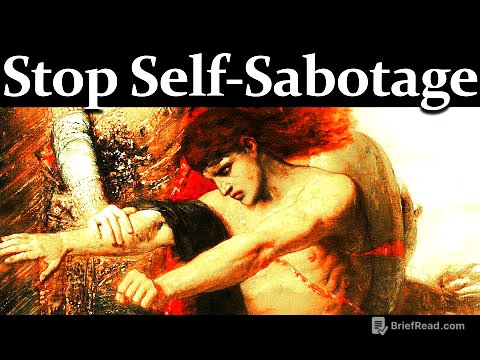TLDR;
The video explores the concept of true happiness, contrasting fleeting pleasures with Aristotle's philosophy of "eudaimonia," or self-fulfillment. It emphasizes that true happiness comes from striving to be the best version of oneself, focusing on personal growth, and seeking meaning rather than chasing external validation or material possessions. The video also touches on the negative impact of social media on happiness due to constant comparison with others.
- True happiness is linked to self-fulfillment and personal growth, not external factors.
- Aristotle's concept of "eudaimonia" emphasizes striving to be the best version of oneself.
- Social media can negatively impact happiness by fostering constant comparison with others.
Introduction: The Complexity of Happiness [0:00]
The video begins by acknowledging the subjective nature of happiness, noting that individual perceptions vary. While common sources of happiness include family, health, friends, money, and career, these are often dependent on external factors beyond our control. The video introduces the ancient Greek concept of "eudaimonia," derived from Aristotle's ethics, as an alternative perspective on achieving true happiness.
Aristotle's View on True Happiness [0:54]
Aristotle believed that equating happiness with wealth or external pleasures is a mistake. These things provide fleeting enjoyment but do not offer lasting satisfaction. The pursuit of external pleasures can lead to misery as individuals become enslaved to their desires, constantly seeking new and additional sources of gratification. This cycle results in a growing sense of emptiness over time.
Self-Fulfillment as the Key to Happiness [1:57]
Aristotle suggests that true happiness lies in self-fulfillment. To illustrate this, the video uses the example of George Clooney, suggesting that his happiness should be measured by whether he is the best actor he can be, rather than by his wealth or possessions. The focus is on personal growth and making the best of one's abilities, rather than comparing oneself to others.
The Importance of Learning and Growth [3:16]
Aristotle emphasized the importance of continuous learning and personal development. Individuals should strive to improve themselves and reflect on their growth over time. This includes personal, social, and professional development.
Modern Society and the Pursuit of Happiness [3:40]
In today's society, happiness is often defined by wealth and pleasure, leading to overconsumption and a constant chase for fleeting gratification. This mindset leaves individuals feeling empty because material possessions do not provide true satisfaction. The video highlights that true happiness comes from seeking meaning rather than pleasure.
The Negative Impact of Social Media [4:23]
Social media can negatively impact happiness by fostering constant comparison with others. Seeing seemingly more successful and happier people can lead to frustration and dissatisfaction. The video contrasts this with the past, where people compared themselves to their immediate surroundings and were often happier despite more difficult living conditions.
Conclusion: Seeking Personal Excellence [5:13]
The video concludes by emphasizing the importance of seeking personal excellence to achieve lasting happiness. True happiness comes from realizing one's full potential morally and intellectually.









